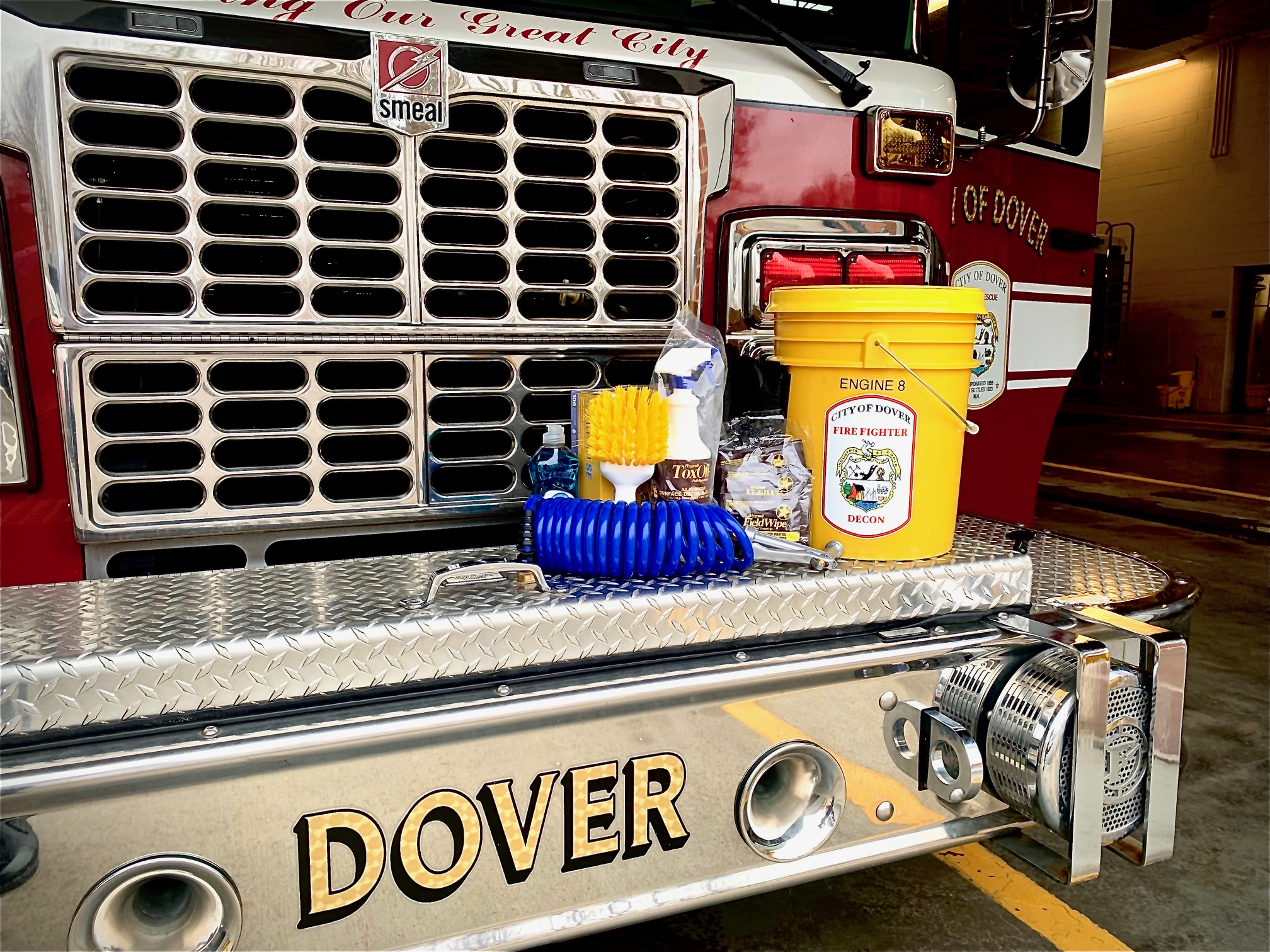posted on: 2/5/2020
 With cancer now a leading cause of firefighter illness and death, Fire Chief Paul Haas announced recently that Dover Fire and Rescue has implemented a “post fire decontamination” program. The goal of the program is to reduce exposure to the harmful chemicals and toxins that permeate a firefighter’s personal protective gear. Research shows the protective gear firefighters wear becomes contaminated with the toxic smoke, soot and charred debris while fighting a fire. These toxic chemicals can later be absorbed into the skin and, if not removed, inhaled when toxic gas is released. This toxic exposure puts firefighters and their families at a greater risk for cancer when compared to the general population, and at much greater risk for specific forms of cancer.
With cancer now a leading cause of firefighter illness and death, Fire Chief Paul Haas announced recently that Dover Fire and Rescue has implemented a “post fire decontamination” program. The goal of the program is to reduce exposure to the harmful chemicals and toxins that permeate a firefighter’s personal protective gear. Research shows the protective gear firefighters wear becomes contaminated with the toxic smoke, soot and charred debris while fighting a fire. These toxic chemicals can later be absorbed into the skin and, if not removed, inhaled when toxic gas is released. This toxic exposure puts firefighters and their families at a greater risk for cancer when compared to the general population, and at much greater risk for specific forms of cancer.
The program will allow protective gear to be decontaminated at the scene of a fire, before the gear is returned to the station. The program is part of Dover Fire and Rescue’s continuing efforts to seek proactive methods, tactics and strategies to reduce the risk of cancer in firefighters.
As part of the program, a “post fire decon” container has been placed on all front-line fire apparatus. These containers include Hygenall Tox-off surface and protective gear cleaner spray, Hygenall full body skin decon wipes, a Decon Brush, a Decon Hose and nozzle, N95 airway protection masks, nitrile gloves and plastic bags for contaminated gear.
Through the use of standard operating guidelines, members will set up a decontamination area at the scene of fire. Members with contaminated protective gear report to a decontamination area where a team will decontaminate protective gear prior to removing the gear or breathing apparatus, if possible. After the initial removal of contaminants, the members will wipe any areas the skin that were contaminated during firefighting operations or during the removal of their protective gear.
When members leave the scene, contaminated gear will be bagged and returned to the station where it will be cleaned in an industrial gear washer and extractor. Members will then shower to further remove any harmful contaminants.
For more information, contact Dover Fire and Rescue at 516-6148.
 With cancer now a leading cause of firefighter illness and death, Fire Chief Paul Haas announced recently that Dover Fire and Rescue has implemented a “post fire decontamination” program. The goal of the program is to reduce exposure to the harmful chemicals and toxins that permeate a firefighter’s personal protective gear. Research shows the protective gear firefighters wear becomes contaminated with the toxic smoke, soot and charred debris while fighting a fire. These toxic chemicals can later be absorbed into the skin and, if not removed, inhaled when toxic gas is released. This toxic exposure puts firefighters and their families at a greater risk for cancer when compared to the general population, and at much greater risk for specific forms of cancer.
With cancer now a leading cause of firefighter illness and death, Fire Chief Paul Haas announced recently that Dover Fire and Rescue has implemented a “post fire decontamination” program. The goal of the program is to reduce exposure to the harmful chemicals and toxins that permeate a firefighter’s personal protective gear. Research shows the protective gear firefighters wear becomes contaminated with the toxic smoke, soot and charred debris while fighting a fire. These toxic chemicals can later be absorbed into the skin and, if not removed, inhaled when toxic gas is released. This toxic exposure puts firefighters and their families at a greater risk for cancer when compared to the general population, and at much greater risk for specific forms of cancer.